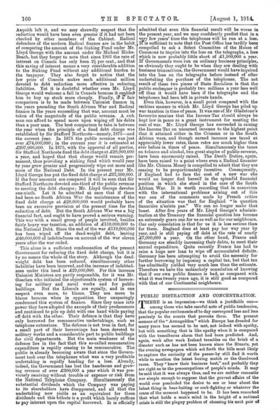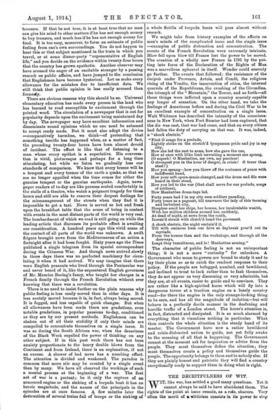PUBLIC DISTRACTION AND CONCENTRATION. T HERE is an impression—we think a
justifiable one_ among those who take careful note of public tendencies, that the popular excitements of to-day correspond less and less precisely to the events that provoke them. The present menace of the " Armageddon " which Europe has dreaded for many years has seemed to be met, not indeed with apathy, but with something that is like apathy when it is compared with the tumultuous alarm that had been predicted. And, again, week after week Ireland trembles on the brink of a disaster such as has not been known since the Stuarts, yet the evening newspapers which set forth the bills most likely to capture the curiosity of the passer-by still find it worth while to mention the latest boxing match or the Goodwood races. They "know their business best," and probably they are right as to the preoccupations of people's minds. It may be said that it was always thus, and we are neither romantic nor simple enough to suppose that the gravest affairs of the world ever precluded the desire to see or hear about the latest thing in bear-baiting or cock-fighting or whatever the craze of the moment happened to be. It has been remarked that what holds a man's mind in the height of a national crisis is still the plaguy problem of choosing his nett pair of
trousers. If that be not true, it is at least true that no man can give his mind to other matters if be has not enough money to buy trousers, and much less if he has not enough money for food. It is too easy, moreover, to form an estimate of public feeling from one's own surroundings. You do not happen to hear this or that subject mentioned in the train in which you travel, or at some dinner-party " representative of English life," and you decide on the evidence within twenty-four hours that the country has grown apathetic. Another observer may have aroused the anger of an excitable stranger by a passing remark on public affairs, and have jumped to the conclusion that Englishmen have become hysterical. Let us make every allowance for the mistakes due to insufficient data. We still think that public opinion is less easily aroused than formmtly.
There are obvious reasons why this should be so. Universal elementary education has made every person in the land who has learned to read susceptible to excitement through the printed word. The circulation of a newspaper that is out for popularity depends upon the excitement being maintained day by day. The newspaper may have excellent information and disseminate sound opinions which no one need be ashamed to accept ready made. But it must also adopt the device —comparatively harmless, we think—of pretending that something terrific has happened when, as a matter of fact, the preceding twenty-four hours have been almost devoid of incident. The effect is like that of listening to a man whose every epithet is a superlative. His conversa- tion is vivid, picturesque and perhaps for a long time stimulating, but while we listen we gradually lose our standards of comparison. We know that every breeze will be a tempest and every tremor of the earth a quake, so that we are no longer appalled when the time comes for either the genuine tempest or the genuine earthquake. Again, news- paper readers of to-day are like persons seated comfortably in the stalls of a theatre, who watch a poignant tragedy for three hours and still are able to reserve their deepest feelings for the mismanagement of the streets when they find it is impossible to get a taxi. News is served so hot and fresh upon the breakfast table that the sense of being in contact with events in the most distant parts of the world is very real. The bombardment of which we read is still going on while the leading article that discusses its probable effect is awaiting our consideration. A hundred years ago this vivid sense of the contact of all parts of the world was unknown. A swift frigate brought news from the Mediterranean of an action a fortnight after it had been fought. Sixty years ago the Times published a single telegram from its special correspondent during the Crimean War. And though news arrived slowly in those days there was no perfected machinery for circu- lating it when it had arrived. We may imagine that there were English peasants who lived through the Peninsular war and never heard of it, like the sequestered English governess of Mr. Maurice Baring's fancy, who taught her charges in a French family through the French Revolution without ever knowing that there was a revolution.
There is no need to insist further on the plain reasons why public feeling is less easily moved than in older days. It is less acutely moved because it is, in fact, always being moved. It is fagged, and less capable of quick changes. But when all allowances have been made there are gradations, even notable gradations, in popular passions to-day, conditioned as they are by our present methods. Englishmen can be shaken out of all their stolidity if only their minds are compelled to concentrate themselves on a single issue. It was so during the South African war, when the dreariness of the Black Week expelled the power of thinking on any other subject. If in this past week there has not been anxiety proportionate to the heavy double blows from the Continent and from Ireland, there is an explanation, if not an excuse. A shower of bad news has a numbing effect. The attention is divided and weakened. The paradox is common that more stir may be created by a single event than by many. We have all observed the workings of such a mental process at the beginning of a war. The first act of war is a portent; be it only the capture of an armoured engine or the sinking of a torpedo boat it has an heroic magnitude, and the names of the principals in the episodes are at once famous. A few months later the destruction of several trains full of troops or the sinking of
a whole flotilla of torpedo boats will pass almost without remark.
We might take from history examples of the effects on men's minds of the complicated issue and the single issue —examples of public distraction and concentration. The events of the French Revolution were extremely intricate. Blow fell upon blow till France lost the power to be moved. The creation of a wholly new France in 1791 by the put-
ting into force of the Declaration of the Rights of Man was a marvellous upheaval in itself. Wonder could scarcely go further. The events that followed: the resistance of the emigres under Provence, Artois, and Conde, the religious rising of the Vendee, the insurrection of cities, the internal
quarrels of the Republicans, the crushing of the Girondins, the triumph of the " Mountain," the Terror, and so forth—all these things were inflicted upon a country scarcely capable any longer of sensation. On the other hand, we take the feelings of Americans before and during the Civil War to be an excellent example of concentration on a single issue. Walt Whitman has described the intensity of the conscious- ness in New York, when Fort Sumter had been captured, that the die was cast, that war had come, and that on every citizen had fallen the duty of carrying on that war. It was, indeed, a "shock electric."
"First 0 songs for a prelude, Lightly strike on the stretch'd tympanum pride and joy in my
city,
How she led the rest to arms, how she gave the cue,
How at once with lithe limb unwaiting a moment she sprang, (0 superb! 0 Manhattan, my own, my peerless!
0 strongest you in the hour of danger, in crisis ! 0 truer than
steel!)
How you sprang—how you threw off the costumes of peace with indifferent hand,
How your soft opera-music changed, and the drum and fife were
heard in their stead, How you led to the war (that shall serve for our prelude, songs of soldiers), How Manhattan drum-taps led.
Forty years had I in my city seen soldiers parading, Forty years as a pageant, till unawares the lady of this teeming and turbulent city, Sleepless amid her ships, her houses, her incalculable wealth, With her million children around her, suddenly, At dead of night, at news from the south, Incens'd struck with clinch'd hand the pavement.
A shock electric, the night sustain'd it,
Till with ominous hum our hive at daybreak pour'd out its myriads.
From the houses then and the workshops, and through all the doorways,
Leapt they tumultuous, and lo! Manhattan arming."
The character of public feeling is not an unimportant thing; it is not a mere " curiosity " for onlookers. A Government who mean to govern are bound to study it and to lay their plans so as to catch the readiest response to their policy. If the people are befogged, numbed, and bewildered, and inclined to trust to luck rather than to fash themselves, they do not appear as very discerning or very admirable, but they are, at all events, easier to guide and to convince. They are rather like a high.spirited horse which will fly into a dangerous terror at a traction engine on a lonely country
road—for there the engine is the only strange-looking thing to be seen, and has all the magnitude of isolation—but will behave in a perfectly docile manner in the deafening and horrific traffic of a London street. The horse's attention is, in fact, distracted and dissipated. It is so much alarmed by everything that it visualizes nothing in particular. What then controls the whole situation is the steady hand of its master. The Government have now a rather bewildered and crisis•distracted nation to guide, not yet fully awake to the meaning of all that is happening. The Government cannot at the moment ask for inspiration or advice from the people. They must themselves define the situation; they must themselves create a policy and themselves guide the people. The opportunity belongs to them and to nobody else. If they are plainly honest and patriotic they will find a country exceptionally ready to support them in doing what is right.



































 Previous page
Previous page